The FA Cup is an annual knockout football competition in England, established in the 1871-72 season. Organized by and named after The Football Association, it holds the distinction of being the oldest national football competition globally. A parallel Women's FA Cup competition has been running since 1970, showcasing the continued growth and importance of women's football.
1901: Tradition of Tying Ribbons to FA Cup Started
In 1901, after Tottenham Hotspur won the FA Cup Final, the wife of a Spurs director initiated the tradition of tying blue and white ribbons to the handles of the cup.
1909: Manchester United Makes Their Own Replica
In 1909, after Manchester United, the FA Cup winners, made their own replica of the trophy, the FA decided to change the design because they did not own the copyright.
1910: Replica Replaces Original Trophy
In 1910, the original FA Cup trophy, which had been stolen in 1895, was replaced by an exact replica.
1911: New FA Cup Trophy Design Introduced
In 1911, a new, larger FA Cup trophy design by Fattorini and Sons was introduced.
1911: Redesign of FA Cup Trophy
In 1911, after the theft of the original FA Cup trophy, a replica was made and used until the trophy was redesigned.
1914: Crystal Palace Hosts its Last Final
In 1914, Crystal Palace hosted its last FA Cup Final.
1920: Stamford Bridge Hosts Finals
Starting in 1920, Stamford Bridge hosted FA Cup finals.
1922: Finals at Stamford Bridge Until 1922
FA Cup finals were held at Stamford Bridge until 1922, after which the games were moved to Empire Stadium.
1923: Death of Lord Kinnaird
In 1923, Lord Kinnaird, the FA's long-serving president, died. The 1895 replica was then presented to the FA's long-serving president Lord Kinnaird.
1923: First Final at Empire Stadium
In 1923, the first FA Cup final was held at the Empire Stadium, later known as Wembley Stadium.
1926: First FA Cup Final on Radio
In 1926, the first FA Cup Final on Radio was broadcast locally in Manchester between Bolton Wanderers and Manchester City.
1927: First national FA Cup Final on BBC Radio
In 1927, the first national FA Cup Final was broadcast on BBC Radio between Arsenal and Cardiff City.
1931: West Bromwich wins FA Cup and earns promotion
In 1931, West Bromwich became the only team to have won the FA Cup and earned promotion to the top flight in the same season.
1937: First FA Cup Final on BBC Television
In 1937, the first FA Cup Final on BBC Television featured Sunderland and Preston North End, but was not televised in full.
1938: Portsmouth Wins the FA Cup
In 1938, Portsmouth defeated Wolverhampton Wanderers 4-1 in the FA Cup Final and were awarded the trophy as 1938-39 FA Cup winners.
1955: ITV shares final coverage with BBC
In 1955, with the formation of ITV, they began sharing FA Cup final coverage with the BBC, marking one of the few club matches shown live on television.
1957: Burge Imprisoned for Theft
In 1957, Henry James Burge was imprisoned for seven years for theft from cars.
February 1958: Burge Confesses to FA Cup Theft
On February 23, 1958, career criminal Henry James Burge confessed in the Sunday Pictorial newspaper to stealing the original FA Cup in 1895.
1960: UEFA Cup Winners' Cup Launch
In 1960, the UEFA Cup Winners' Cup was launched, offering the FA Cup winners a spot in the competition.
1961: Burge Released from Prison
In 1961, Henry James Burge was released from prison.
1964: Death of Henry James Burge
In 1964, Henry James Burge died.
1970: Replay at Old Trafford
In 1970, the FA Cup final replay between Leeds United and Chelsea was held at Old Trafford in Manchester, marking an exception to the series of Empire Stadium finals.
1973: Sunderland defeats Leeds United in major upset
In 1973, Sunderland's FA Cup win against Leeds United, who finished third in the top flight that season, was considered a major upset.
1980: West Ham defeats Arsenal
In 1980, West Ham's victory over Arsenal was significant as Arsenal were the cup holders, had just finished 4th in the First Division, and were in their third successive FA Cup Final, while West Ham had ended the season 7th in Division 2.
1988: BBC becomes exclusive broadcaster
In 1988, ITV lost coverage rights, making the BBC the exclusive broadcaster of the FA Cup on terrestrial television. The BBC covered the competition from the third round onwards, showing one live match per round alongside highlights.
1988: BBC and ITV shared FA Cup Broadcast
The 23rd of May 2019, it was announced that ITV would replace BT Sport in broadcasting the FA Cup from the 2021–22 season. This deal saw the BBC and ITV become joint broadcasters of the tournament for the first time since 1988, which meant that, for the first time, all FA Cup matches would be exclusively broadcast on free-to-air television.
1990: BSB obtains rights to the competition
In 1990, British Satellite Broadcasting (BSB) acquired the rights to the FA Cup competition and broadcast live matches from rounds 1 and 2.
1991: Sky takes over BSB and continues FA Cup coverage
In 1991, Sky took over BSB and continued the live broadcasts of FA Cup matches from rounds 1 and 2.
1991: Wembley Stadium Used for Semi-Finals
In 1991, Wembley Stadium was used for semi-final FA Cup games.
1992: Exact Replica Replaces Original
In 1992, the original Fattorini and Sons trophy was replaced by an exact replica to preserve it.
1997: BBC remains exclusive broadcaster
From 1988 to 1997, the BBC was the exclusive broadcaster of the FA Cup on terrestrial television, covering the competition from the third round onwards, showing one live match per round alongside highlights.
1997: Sky owns FA Cup coverage with ITV sublicensing
From 1997, Sky owned the coverage rights to the FA Cup, showing one match per round, while ITV sublicensed the free-to-air rights and showed an additional match from the third round onwards. The BBC continued with highlights on Match of the Day.
1997: Previous World Record for Jules Rimet World Cup Trophy
In 1997, the Jules Rimet World Cup Trophy was sold for £254,000.
1998: End of UEFA Cup Winners' Cup
In 1998, the final edition of the UEFA Cup Winners' Cup took place, ending the FA Cup winners' direct entry into that competition.
2000: Last FA Cup Semi-Final Held at Original Wembley Stadium
In 2000, the last FA Cup semi-final was held at the original Wembley Stadium.
2001: Sky coverage ends, shared rights to BBC
From 1997 to 2001, Sky owned the coverage rights showing one match per round, but the free-to-air rights sublicensed to ITV who showed an additional match from the third round onwards. The BBC continued with highlights on Match of the Day.
2001: BBC and Sky share FA Cup coverage
From 2001, the BBC and Sky shared coverage of the FA Cup, with the BBC showing two or three matches per round and Sky having one or two.
2001: Finals Relocated to Millennium Stadium
In 2001, the FA Cup finals were moved to the Millennium Stadium in Cardiff due to the Wembley Stadium rebuilding process.
2003: Ground Move Restrictions Introduced
In 2003, new regulations were implemented preventing clubs from moving FA Cup match venues to the away side's ground for capacity or financial gains. Any necessary move had to be to a neutral venue, with additional revenue going into a central fund.
2003: FA Decides to Permanently Use Wembley for Semi-Finals
In 2003, the FA decided to permanently use the new Wembley Stadium for semi-finals to help pay off debts, sparking controversy over fairness to fans and diluting the prestige of the final.
May 2005: 1895 FA Cup Replica Sold at Auction
On May 19, 2005, the 1895 FA Cup replica was sold at Christie's auction for £420,000 (£478,400 including fees and taxes), setting a new world record for football memorabilia.
2005: Millennium Stadium Hosts Semi-Finals
In 2005, both FA Cup semi-finals were held at the Millennium Stadium.
April 2006: Gold Presents Trophy to National Football Museum
On April 20, 2006, David Gold presented the 1895 FA Cup replica to the National Football Museum in Preston, where it went on public display.
2006: Finals Held at Millennium Stadium until 2006
From 2001 until 2006, FA Cup finals were held at the Millennium Stadium due to the Wembley Stadium rebuilding process.
2007: Final Played at Rebuilt Wembley Stadium
In 2007, the FA Cup final was played at the rebuilt Wembley Stadium for the first time.
2007: Wembley Stadium Hosts Final
In 2007, the rebuilt Wembley Stadium hosted its first FA Cup final.
2008: BBC and Sky share coverage until this date
From 2001 to 2008, BBC and Sky again shared FA Cup coverage with BBC having two or three matches per round and Sky having one or two.
2008: Wembley Stadium Hosts Semi-Finals Exclusively
From 2008 onwards, the rebuilt Wembley Stadium became the exclusive venue for FA Cup semi-final matches.
2008: FA Cup Coverage on STV
From 2008 to 2014, content from the FA Cup competition was replaced by regular network programmes and local content made in Scotland, films and specials.
2008: ITV and Setanta Sports to Broadcast FA Cup
From the 2008–09 season, FA Cup matches were shown live by ITV across England and Wales, with UTV broadcasting to Northern Ireland. Setanta Sports also showed matches, including ITV's matches in Scotland.
2008: ITV Local provides online FA Cup coverage
In 2008, the early rounds of the FA Cup competition were covered for the first time by ITV's online service, ITV Local, broadcasting the first match live online.
2008: Three semi-finalists from outside the top division
In 2008, three of the four FA Cup semi-finalists (Barnsley, Cardiff City and West Bromwich) were from outside the top division, but the eventual winner was Portsmouth, the last remaining top-flight team.
2008: BBC and Sky Sports Shared Television Coverage
Until the 2008–09 season, the BBC and Sky Sports shared television coverage, with the BBC showing three matches in the earlier rounds.
June 2009: Setanta Sports enters administration
In June 2009, Setanta Sports entered administration, leading to the FA terminating Setanta's deal to broadcast FA-sanctioned competitions and England internationals.
October 2009: ITV to show additional matches in FA Cup
In October 2009, the FA announced that ITV would show an additional match in the first and second rounds of the FA Cup competition, with one replay match shown on ITV4. One match was broadcast on the FA's website for free.
2009: ITV exclusively shows FA Cup
As a result of Setanta going out of business in 2009, ITV showed the FA Cup competition exclusively in the 2009–10 season, broadcasting between three and four matches per round live.
2010: ESPN buys FA Cup rights
In 2010, ESPN acquired the broadcast rights for the FA Cup competition from the 2010–11 to 2012–13 season.
2010: ESPN took over the FA Cup rights
In 2010, ESPN acquired the rights for the FA Cup competition from the 2010–11 season.
2010: FA Cup match to be streamed online live
The 2009–10 first-round FA Cup match between Oldham Athletic and Leeds United, streamed online in October 2009, was the first match in the FA Cup to be broadcast online live.
2011: 2011 FA Cup Final shown live on Sky 3D
In 2011, the FA Cup final was broadcast live on Sky 3D, in addition to ESPN and ITV.
November 2012: 1895 FA Cup Presented to Royal Engineers
In November 2012, the 1895 FA Cup replica was ceremonially presented to the Royal Engineers after their charity replay win.
2012: Rebecca Lowe hosts the FA Cup Final
During the ESPN broadcast of the FA Cup, in 2012, Rebecca Lowe became the first woman to host the FA Cup Final in the UK.
2013: End of ITV's broadcast of FA Cup matches
From 2008-09 to 2013-14, FA Cup matches were shown live by ITV across England and Wales, with UTV broadcasting to Northern Ireland.
2013: BT Sport takes over FA Cup rights
From the 2013–14 season, BT Sport acquired ESPN's rights package for the FA Cup competition following the sale of ESPN's UK and Ireland channels to BT.
2013: Wigan Athletic wins FA Cup and gets relegated
In 2013, Wigan Athletic became the only team to have won the FA Cup and been relegated from the top flight in the same season.
2013: Neutral Tickets for Wembley Semi-Final
In 2013, the FA Cup semi-final fixture between Millwall and Wigan Athletic led to the unprecedented step of placing 6,000 tickets on sale to neutral fans after the game failed to sell out, indicating opposition to Wembley semi-finals.
2013: Commission of the Current Trophy
In 2013, the current FA Cup trophy was commissioned, handcrafted using age-old techniques and incorporating original features like grapes, vines, and fluting.
November 2014: First FA Cup Match on 3G Pitch
On November 20, 2014, the first match in the proper rounds of the FA Cup to be played on a 3G surface was a televised first-round replay at Maidstone United's Gallagher Stadium.
2014: FA Cup Coverage on STV
From 2008 to 2014, content from the FA Cup competition was replaced by regular network programmes and local content made in Scotland, films and specials.
2014: S4C Broadcast
From 2014, Matches involving Welsh clubs are sometimes exclusively broadcast on Welsh language channel S4C, which is also available to view across the rest of the United Kingdom on satellite and cable television, and through the channel's website.
2014: ITV loses rights to the FA Cup
In 2014, ITV lost the rights to the FA Cup, and the terrestrial rights reverted to BBC Sport, with the final being shown on BBC One and BT Sport holding the pay TV rights. The BBC would show around the same number of games as ITV and still have the first pick for each round.
2014: STV broadcasted the 2014 FA Cup Final Live
In 2014, STV continued to broadcast regular programming in place of FA Cup games, live draws and highlights shows throughout this period, although it did the broadcast the 2014 final live.
2014: Third FA Cup Replica Introduced
In 2014, a third FA Cup replica was introduced, built heavier to withstand increased handling.
2015: S4C Broadcasts
From 2014 to 2015, Matches involving Welsh clubs are sometimes exclusively broadcast on Welsh language channel S4C, which is also available to view across the rest of the United Kingdom on satellite and cable television, and through the channel's website. A similar arrangement is shared with BBC Cymru Wales.
2015: Artificial Turf Permitted in All FA Cup Rounds
From the 2014–15 edition onwards, the FA permitted artificial turf (3G) pitches in all rounds of the FA Cup competition. Under the 2015–16 rules, the pitch must meet FIFA One Star or Two Star quality standards.
2015: UEFA Europa League Qualification Rule Change
From the 2015-16 UEFA Europa League season, UEFA disallowed FA Cup runners-up from qualifying for the Europa League through the competition. If the FA Cup winner already qualified for a European Competition, the Europa League berth is given to the highest-placed Premier League team not yet qualified.
2015: FA Cup Trophy Loan Rules (2015-16)
Under the current (2015-16) FA Cup rules, the winning club is loaned the FA Cup trophy, which must be returned by March 1, or earlier if given seven days' notice.
May 2019: ITV replaces BT Sport in broadcasting the FA Cup
On 23 May 2019, it was announced that ITV would replace BT Sport in broadcasting the FA Cup from the 2021–22 season.
September 2020: Gold Sells the Replica Trophy
In September 2020, David Gold sold the 1895 FA Cup replica trophy for £760,000 through Bonhams auction house.
January 2021: Sheikh Mansour Purchases Trophy
In January 2021, it was revealed that Sheikh Mansour bin Zayed Al Nahyan, owner of Manchester City, had purchased the 1895 FA Cup replica and would loan it to the National Football Museum.
2021: BBC and ITV become joint broadcasters of the FA Cup
From the 2021–22 season, the BBC and ITV became joint broadcasters of the FA Cup, for the first time since 1988.
2023: Last time a team from outside the top division won the FA Cup
As of 2023, the 1980 FA Cup win by West Ham marked the last time a team from outside the top division won the FA Cup.
Mentioned in this timeline
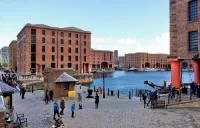
Liverpool is a port city and metropolitan borough located in...

Football is a family of team sports primarily involving kicking...
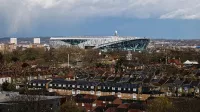
Tottenham is a district in north London part of the...
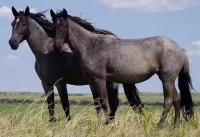
The horse scientifically known as Equus ferus caballus is a...
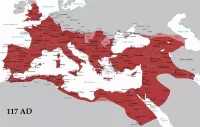
An empire is a political structure consisting of a dominant...
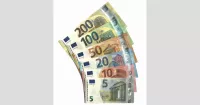
The euro is the official currency of the eurozone which...
Trending
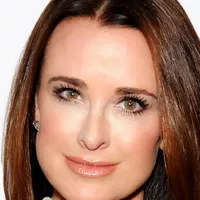
2 months ago Kyle Richards updates dating life post-split, clarifying feelings on marriage after Umansky.

4 months ago Hasan Piker's Radicalism, Kamala Harris Stance, and TwitchCon Safety Concerns Highlighted.
Brandon Miller is an American professional basketball player currently playing for the Charlotte Hornets in the NBA A consensus five-star...

9 months ago Cooper Flagg buzzes at NBA Draft Combine, projected first pick alongside Dylan Harper.

Jaden Edward Dhananjay Ivey is an American professional basketball player currently playing for the Detroit Pistons in the NBA Before...

8 months ago NHL teams consider reuniting Toews and Kane during Patrick Kane's free agency.
Popular

Thomas Douglas Homan is an American law enforcement officer who...

William Franklin Graham III commonly known as Franklin Graham is...

XXXTentacion born Jahseh Dwayne Ricardo Onfroy was a controversial yet...

Jupiter is the fifth and largest planet from the Sun...

Kristi Noem is an American politician who has served as...

Instagram is a photo and video-sharing social networking service owned...